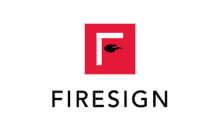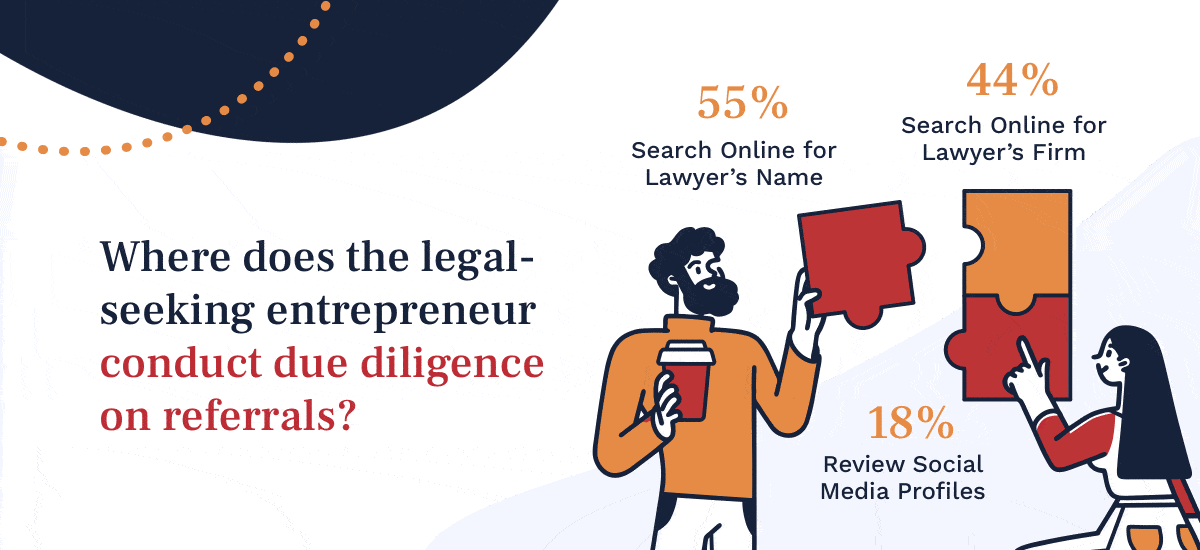From taxes to torts, there’s considerable opportunity for law firms to serve the nation’s 33 million small businesses, a demographic with the potential to generate upwards of 420 million legal matters each year.
But this group doesn’t behave as consumers or corporations do, and their engagement varies depending on their buying stage. Firesign surveyed 100 small business owners and leaders to learn how they scout and select lawyers. In the first part of our series, we looked at how they interacted with lawyers and law firms before they had a specific legal need. In this installment, we’ll explore what happens after that need arises.
When a problem (or opportunity) surfaces that merits lawyer involvement, where do small businesses turn?
To their networks, by a wide margin: 63 percent of small business scouting lawyers will ask colleagues and friends for a referral, and 31 percent will ask another lawyer. These numbers absolutely dwarf other avenues; the next-highest response, “Searching for the relevant subject matter, i.e. ‘employment lawyer’,” was only used by 9 percent.
It’s conventional wisdom, but a key point all the same: Small business clients are three to seven times more likely to seek lawyers by referrals than any other tactic.
But they may not make their decisions based on referrals alone; in fact, a large number of small business operators conduct due diligence on the lawyer recommended to them. More than half (55 percent) review search results for the lawyer’s name; 44 percent review search results for the lawyer’s firm.
And a note of caution: A not-insignificant amount (18 percent) review the lawyer’s social media profiles. With this in mind, schedule a quarterly review of your LinkedIn page: Is it complete, accurate and relevant to your audience? Does it provide your contact information? At the same time, review the privacy settings on more informal social channels, such as X, Instagram and Facebook, to ensure new acquaintances only see what you want them to.
When it comes to establishing credibility with this audience, the most critical and trusted tool is the lawyer biography, used by 92 percent of small business operators in their selection process. Among the other valued tools: online reviews (83 percent) and law firm content (72 percent).
It’s interesting to note the shifting role that law firm content plays as a small business moves along its legal buying journey. Before an incident occurs, recall that 37 percent of these clients will browse law firm content. After, law firm content is cited as helpful to lawyer selection by nearly double that amount. This should be taken into account for law firm marketing strategies; what topics and types of content can help you close?
For these individuals – potential small business clients with a specific need, actively shopping for a solution – the best content is practical. Instead of publishing Supreme Court updates or broad explorations of a given subject, think pragmatically, and focus on what can help them understand the process. This can include Frequently Asked Questions, definitions of relevant legal terms, a list of documents a client would need to get started, or a general timeline.
Assuming due diligence goes well, nearly half – 46 percent – of small business operators will consider just one lawyer for their problem. And they act fast, with 60 percent hiring a lawyer within one week. Entrepreneurs move fast – and they want fast solutions to their problems. Law firms that are unresponsive or overly bureaucratic with Intake can risk losing this business to a faster, nimbler rival.
What marketing strategies can help you win the business of small business?
- Cultivate strong referral networks (and practice good referral karma). Make sure referrals are a key component of any coaching or business development training curriculum.
- Be vigilant on your online profiles, from your biography to social media pages.
- Have a proactive strategy to collect positive reviews, and keep an eye on sites like Avvo to address negative reviews.
- Speed-test your Intake process to ensure you match your prospects’ sense of urgency.
Up next: How to retain small business clients after that first matter.
To learn how to attract, win and retain work from small businesses, download Firesign’s report, From Referrals to Recon: How Small Businesses Hire Lawyers.

